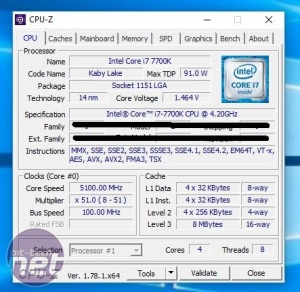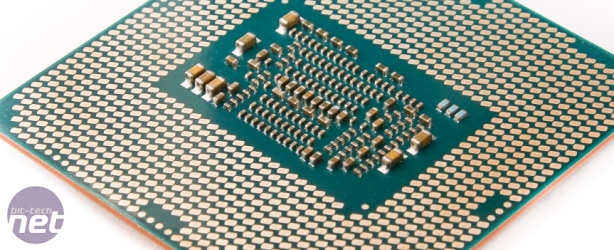
Overclocking
We'd heard that Kaby Lake was proving to be a toasty customer when overclocking and that it needed more voltage than Skylake to achieve similar overclocks. That clearly doesn't bode well for enthusiasts that plan on snapping up a K-series CPU when they land next year but thankfully the signs from our testing are that things may actually be fairly good. Our in-house Core i7-6700K was usually stubbornly limited to 4.8GHz. With water-cooling and pumping well over 1.4V through the CPU we did manage to get it to 4.9GHz but looking back the last time we managed much more than this was with Sandy Bridge and, to some extent, Ivy Bridge. Everything since has struggled to get near 5GHz using standard cooling.
Our in-house Core i7-6700K was usually stubbornly limited to 4.8GHz. With water-cooling and pumping well over 1.4V through the CPU we did manage to get it to 4.9GHz but looking back the last time we managed much more than this was with Sandy Bridge and, to some extent, Ivy Bridge. Everything since has struggled to get near 5GHz using standard cooling. Now, any results should be taken with a pinch of salt. No two CPUs overclock the same so anyone saying Kaby Lake is a great overclocker just because their one sample is a daemon of an overclocker simply doesn't grasp the overclocking landscape particularly well. It's a lottery, pure and simple.
However, we managed to get our sample to 5.1GHz - the best result we've seen for an age and even better than we managed with Sandy Bridge.
Sure, this did need a hefty 1.44V and temperatures were edging into the 90s using Prime95's small FFTs test for stress testing with a Corsair H105 CPU cooler, but there is a glimmer of hope here that we may be dealing with a rather decent overclocker when it comes to Kaby Lake.
Indeed, with a 300MHz higher boost speed out the gate starters and an improved manufacturing process, you'd kind of hope that there was some extra headroom anyway.

Conclusions
We're not in the habit of coming to any firm conclusions without an idea of retail price and indeed the full specifications. The Core i7-7700K, though, is roughly where we expected it to be, with a noticeable boost at stock speed over its predecessor across the board thanks to a hike in clock speed, but for the moment with slightly higher power consumption. That's not likely to be even a minor gripe for most enthusiasts though.It's likely BIOSes will be further refined between now and launch so whether or not power consumption and heat will be larger or smaller than those you'd experience with a Core i7-6700K remains to be seen. Was our sample a good overclocker? Yes. Did it get toasty and need more voltage than usual? Yes. Can we assume that these characteristics will apply to any and all retail CPUs? No. In other words, watch this space.

MSI MPG Velox 100R Chassis Review
October 14 2021 | 15:04








Want to comment? Please log in.